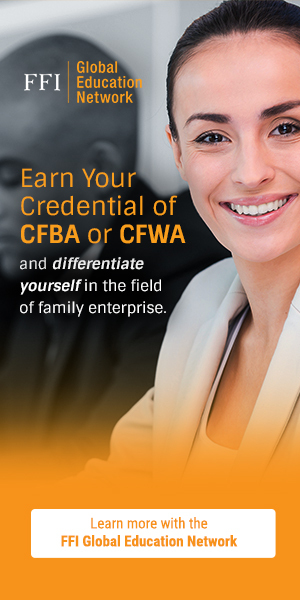Best Practices
Adopted September 2019
Members of the Family Firm Institute (FFI) are encouraged to maintain the highest standards of professionalism. The Best Practices described below are recommendations for FFI members to consider in conducting their practices.
Commitment to Clients
- At the outset of an engagement, the family enterprise advisor or consultant should state in writing whose interests he or she is representing during the course of the engagement. Should the need arise to revise the definition of “client” during the engagement, this need should be communicated to, and negotiated with, all appropriate parties and confirmed in writing.
- Members should accept engagements for which they possess the requisite proficiencies and experience to provide competent services to the client. When working with other advisors and professionals on a client’s behalf, members should take reasonable measures to ensure the competency of these advisors and professionals.
- Members, their organizations, and professional associates should keep client information and the identity of the client confidential and should not disclose it without the written consent of the client.
- In all instances, members should accurately represent their education, training, experience, professional credentials and competence, or areas of skill and expertise.
- Members should provide their clients with all appropriate information obtained in the course of the engagement that is pertinent to the client.
- Members should disclose in writing, and at the outset of every engagement, the basis of their fees and expenses and provide an estimate of the total cost of the service whenever possible.
- Members should attempt to establish realistic expectations for the benefits and results of their services at the outset of the engagement and should revise these expectations along the way, if necessary.
- When members refer clients to other advisors, those members should disclose to their clients the nature of any business relationship between the member and the advisor or the advisor’s organization and whether there will be any referral fee or other fee sharing.
- Members should avoid real or perceived conflicts of interest whenever possible and should disclose them to the affected parties.
- Members, in their professional activities, should treat all persons fairly regardless of gender, race, religion or belief, nationality, ethnic or social origin, age, sexual identity or orientation, marital status, disability or any other characteristic protected under applicable law.
Commitment to FFI
- Members are encouraged to promote their affiliation with the Family Firm Institute (FFI) and their status as an FFI certificate graduate. However, members should not imply that being a member of FFI or holding an FFI certificate implies either credentialing or endorsement by FFI.
- Members should support FFI’s mission to be the most influential global network of thought leaders in the family enterprise field and should take positive steps in furtherance of this mission.
- Members are strongly encouraged to share FFI publications with their networks and clients. However, in doing so, members must recognize and respect FFI’s intellectual property rights in these publications.
Commitment to the Family Enterprise Field
- Members should keep current in their professional practices through self-study and regular attendance at family enterprise-related conferences and courses.
- Members should assist other members in their professional development, where possible and appropriate.
- Members should recognize and respect intellectual property rights including providing specific acknowledgment of the original authorship and source when publishing or publicly representing another person’s work.
- Members who do research should carry out the research with respect and concern for the dignity and welfare of the people who participate. It is a member’s sole responsibility to ensure that their subjects are adequately informed and abide by the relevant laws and regulations regarding the conduct of research with human participants.
Membership in FFI creates no express or implied duty to adhere to the above Best Practices. FFI does not undertake or assume, and specifically disclaims, any responsibility for monitoring or reviewing the conduct of its members or their adherence to the above suggested Best Practices. These Best Practices are not intended to be relied upon by clients of FFI members, or by any other third parties. None of the above Best Practices are intended to, nor do they, supplant any applicable code of ethics, or any other licensure or accreditation requirements, for any specific profession.

